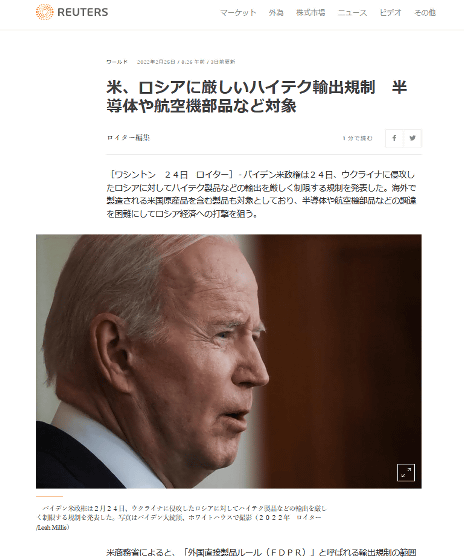Intel and AMD stop selling semiconductors to Russia, TSMC also participates in sanctions and may affect Russian domestic chips

As part of sanctions against
AMD и Intel приостановили поставки своей продукции на территорию России — РБК
https://www.rbc.ru/technology_and_media/27/02/2022/621a7f4f9a79473d8899b18d
Intel and AMD Halt Processor Sales to Russia: Reports (Updated) | Tom's Hardware
https://www.tomshardware.com/news/intel-amd-nvidia-tsmc-russia-stop-chip-sales-ukraine-sanction
On February 24, 2022, the US government announced export restrictions on high-tech products related to semiconductors and aviation parts following Russia's military invasion of Ukraine. President Joe Biden emphasizes the significance of the new export restrictions as 'immediate and long-term serious costs to the Russian economy.'
Strict high-tech export restrictions on US and Russia Targets semiconductors and aircraft parts | Reuters
https://jp.reuters.com/article/ukraine-crisis-biden-exportcontrols-idJPKBN2KT3G9

Meanwhile, Russian news media RBC reported that 'Intel and AMD have stopped supplying their products to Russia', as information from IT market officials. According to sources, Intel and AMD have verbally informed related companies that product supply to Russia will be temporarily stopped, and Chinese related companies have also notified Intel's local supply of processors to Russia. It seems that it was received from the office, and the Russian developer and the Intellectual Manufacturers Association (ARPE) also confirmed this information.
An Intel spokeswoman told tech media Tom's Hardware that 'Intel has new sanctions issued by the Office of Foreign Assets Control (OFAC) of the US Treasury and regulations announced by the Bureau of Industry and Security (BIS) of the United States Ministry of Commerce. We comply with all export controls and sanctions that apply in the countries in which we operate. '
This time, the United States has imposed export restrictions mainly on chips for military purposes and chips that can be used for both civilian and military purposes, such as products used for humanitarian purposes and space exploration, PCs and smartphones. Consumer products are not regulated. However, Intel and AMD also need to check 'Which products are regulated and which are not', so all product exports are expected to be temporarily suspended. In addition, if it becomes necessary to obtain approval for products that are not subject to regulation, it may adversely affect the industry in Russia.

TSMC, the world's largest semiconductor foundry based in Taiwan, has also announced that it will participate in sanctions on Russia . CNews, a Russian news site, points out that participation in TSMC sanctions could hinder Russia's supply of domestic chips, as Russian semiconductor manufacturers such as Baikal Electronics and Yadro outsource manufacturing to TSMC. I am.
США блокируют производство российских процессоров. «Байкалы» и «Эльбрусы» под ударом --C News
https://www.cnews.ru/news/top/2022-02-25_ssha_hotyat_sabotirovat_proizvodstvo
Tom's Hardware argues that US export restrictions are a national application of restrictions on Huawei . In addition, it seems that Russia's share of the semiconductor market is only less than 0.1%, and it will not have a catastrophic impact on the semiconductor industry such as Intel and AMD.
Related Posts:







